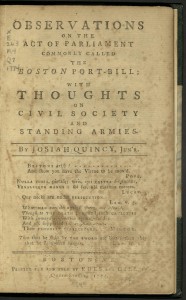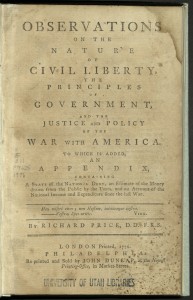Tags
American, Benjamin Franklin, Bill of Rights, Boston, Boston Gazette, Boston Massacre, British, colonial, colonies, David Hume, Dunlap, Edmund Burke, England, Great Britain, independence, John Adams, John Wesley, Josiah Quincy, London, monarchy, pamphlet, Philadelphia, Richard Price, Stamp Act, tuberculosis, William Pitt
“…that sacred blessing of Liberty, without which man is a beast, and government a curse”
“No free government was ever founded or ever preserved its liberty without uniting the characters of the citizen and soldier in those destined for the defence of the state…such are a well-regulated militia…who take up arms to preserve their purposes, as individuals, and their rights as freemen.”
OBSERVATIONS ON THE ACT OF PARLIAMENT…
Josiah Quincy (1744-1775)
Boston, N.E., Printed for and sold by Edes and Gill, 1774
First edition
Attorney Josiah Quincy, a Boston native, wrote a series of anonymous articles for the Boston Gazette in which he opposed the Stamp Act and other British colonial policies. His evenhandedness, however, in his approach to the troubles between the American colonies and England, served him and the colonial stance well. He, along with John Adams, defended the British soldiers in their trial after the Boston Massacre. That act aside, in Observations, Quincy urged “patriots and heroes” to “form a compact for opposition…For, under God, we are determined that wheresoever, whensoever, and howsoever we shall be called to make our exit, we will die free men.” In the same year as this publication, Quincy went to England to argue the colonial cause. He died of tuberculosis on the way home in sight of land.
“Our own people, being unwilling to enlist, and the attempts to procure armies of Russians, Indians, and Canadians having miscarried; the utmost force we can employ, including foreigners…This is the force that is to conquer…determined men fighting on their own ground, within sight of their houses and families, and for that sacred blessing of Liberty, without which man is a beast, and government a curse. All history proves, that in such a situation, a handful is a match for millions.”
OBSERVATIONS ON THE NATURE OF CIVIL LIBERTY…
Richard Price (1723-1791)
London printed 1776; Philadelphia, Re-printed and sold by J. Dunlap, 1776?
Richard Price, radical in his religious and political views, was well-known in Great Britain as a writer on economic and political issues. A close friend of William Pitt, David Hume, and Benjamin Franklin, he became one of Britain’s most vocal supporters of American independence. Several thousand copies of Observations were sold within a few days. The pamphlet both extolled the rights of the American colonists and excoriated the British crown. Harshly criticized by John Wesley, Edmund Burke, and others, the controversy quickly made Price a celebrity. Price argued that governments held their power in trust from the people and were not instruments of divine authority. The monarchy of England, he said, was only legitimate because it ruled by consent of the people under England’s Bill of Rights. The revolutionaries in the American colonies were merely asserting the same principle. His pamphlet played no small part in encouraging the colonists to declare independence. In 1778 he was invited by Congress to go to America and assist in the financial administration of the states. He refused the offer, unwilling to quit his own country.



“a handful is a match for millions”
I’ll use this inspiring comment in my course on Global Citizenship. Thank you for bringing this text to my attention!
Agreed! Words to live by.